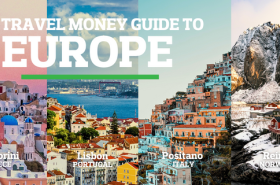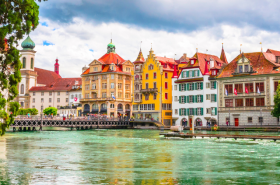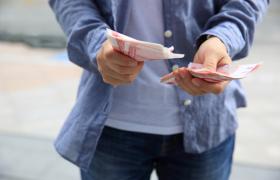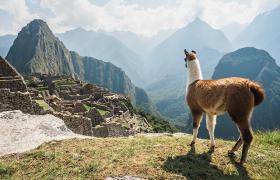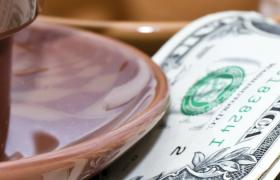Embarking on an adventure to Brazil is an incredibly exciting prospect. As the largest country in South America, Brazil has so much culture, spirit and natural wonders to share with the world. Whether you plan on soaking up the energy of Carnival and Rio or heading deep into the Amazon to experience some of life's simpler pleasures, Brazil has something to offer every traveller.
If deciding where to spend your time in Brazil wasn't hard enough, planning a trip also requires you to work out the dreaded travel budget. Ugh, we know, the words send shivers down our spine too. But, the good news is the team at Travel Money Oz have created a nifty travel budget planner that combines Numbeo data with the latest exchange rates to give you the most up to date idea of how much a trip to Brazil will set you back. That way you can spend less time stressing over numbers and more time thinking about the Copa, Copacabana!
Before we dive into the calculator, let's take a quick look at what is actually included in a Brazilian travel budget.
What goes into a budget for Brazil?
Transport
South America is quite the hike from Australia, so your flights will generally be your most significant expense. Thankfully, routes are becoming more popular, which is pushing prices down. Expect to pay between $900 (rare but not unheard of) and $2,000 (ouch) for your flights to Brazil.
Once you arrive, there are a few different options for your long-distance travel:
Bus – the cheapest and easiest option. The buses in Brazil are comfortable and economical with hundreds of routes across the country. Expect to pay between 100 and 300 BRL depending on how far the journey is.
Train – while the train is an option, the rail network is minimal and only serves the major tourist hubs. Train tickets are also quite a bit more expensive than the bus.
Flying – Domestic flights are a great option if you're in a rush with a bit more cash to splash. We recommend booking in advance to save money, and if you plan on flying a few times within Brazil and South America within 30 days, it is worth considering an Airpass offered by a few of the airlines.
In cities and towns themselves, your main transport options include subway, buses and taxis. Rio and Sao Paolo both have great subway systems, as well as buses that connect where the tube does not. Expect to pay around 3 BRL for a single trip, or grab a multi-day metro card if you're making multiple trips a day.
Taxis are generally the recommended option for tourists at night, as it isn't always safe on public transport. Make sure you always used licensed taxis (they can be ordered through an app) for safety. Taxi fares start at 5.50 BRL and go up about 2.5 BRL per km.
Accommodation
Brazil is a big country, so accommodation standards and prices can fluctuate widely with each city and seasonality. As you would expect, there are more options in bigger cities compared to smaller towns; however, the increased choice does lead things to be more expensive. On average, you can expect to pay the following:
- Hostel dorms: between 25 and 50 BRL per night
- Budget hotels: from 100 to 150 BRL. We recommend choosing a place with air conditioning and breakfast included
- Airbnbs: 50 to 300 BRL per night depending on the space you want
- Luxury hotels and spas: 200 BRL + per night
It's also worth noting that accommodation prices in Rio during Carnival will often triple, as will beachside destinations during peak season.
Food
While some fine-dining experiences will greet you in bigger cities, you can't get the true essence of Brazilian cuisine unless you enjoy some rustic (and cheap) street food. Consider the following dishes that are both delicious and very friendly on the travel budget:
- Pastel: deep-fried pastry with a filling
- Bean soup: the name kinda sums it up
- Coxinha: deep-fried chicken pockets
- Canjica: white corn mixed with milk, coconut milk, condensed milk and cinnamon. A seriously delicious dessert
- Acai: the superfood we all know and love
- Pao de Queijo: gluten-free cheese bread
- Empanada: mini pies filled with dried meat, chicken, prawns or palm heart
- Coxinhas: shredded chicken wrapped in dough that is then battered and fried
- Feijoada: black beans cooked with meat chunks served with kale, bacon, rice and orange.
- Prawn skewer: eat these chunky skewers on the beach
On average, street food should cost you between 2 and 20 BRL, which is great because even the budget travellers splurge a little. If you are after the finer things in life, three-course meals will start at around 100 BRL and go up from there, especially in Sao Paolo and Rio.
Last but not least, an ice-cold beer should cost you between 5 and 10 BRL. Keep an eye out for happy hours and specials to save a little more cash.
Activities
One thing is for sure; you will not get bored in Brazil. Huge cities packed to the brim with both free and paid events, as well as a country full of incredible natural spectacles, the hardest part will be deciding on what you spend your time doing.
While many natural wonders can be accessed for free, we do recommend joining a tour for specific expeditions like visiting the Amazon. These will, of course, come at a cost, so it's best to spend some time researching to find a tour or guide that will meet your needs. With this in mind, while you're in Brazil, consider checking out the following:
- Spend time in Rio de Janeiro. Home to Corcovado, Christ the Redeemer, Copacabana beach and Tijuca forest.
- Party at Carnival festival, one of the biggest celebrations before the start of Lent.
- Explore the Amazon River and rainforest. This one speaks for itself.
- See the wildlife in Pantanal, which is home to over 11,000 different species. You'll generally need to book a multi-day expedition to get the most of this.
- Visit Gruta Do Lago Azul, or the Blue Lake Grotto, to see some of the most pristine, crystal clear blue water.
- Marvel at the natural wonder that is Iguacu falls
- Visit Salvador to experience their vibrant Afro-Brazilian community, incredible restaurants, bars, shopping, live music and great photo opportunities.
- Get lost in Sao Paulo, the third-largest city in the world that over 20 million people call home. Expect wild nightlife, plenty of live music and excellent food.
- Take a capoeira lesson
- Go to a soccer (Futbol) game. Rio's stadium is one of the largest in the world, seating 100,000 revelers, so being apart of the crowd is an experience in itself.
Pre-travel expenses
Recently the laws have changed and Australian citizens don't need a visa to enter Brazil as tourists or in transit. If you are visiting for other reasons, we do recommend checking with the embassy or consulate. Travellers to Brazil are also required to carry a yellow fever vaccination certificate, so visit your doctor to obtain that, as well as any other relevant vaccinations.
Finally, a comprehensive travel insurance policy is a must for any traveller, regardless of where they are going. These vary in price, so be sure to do some research and account for it in your travel budget.




